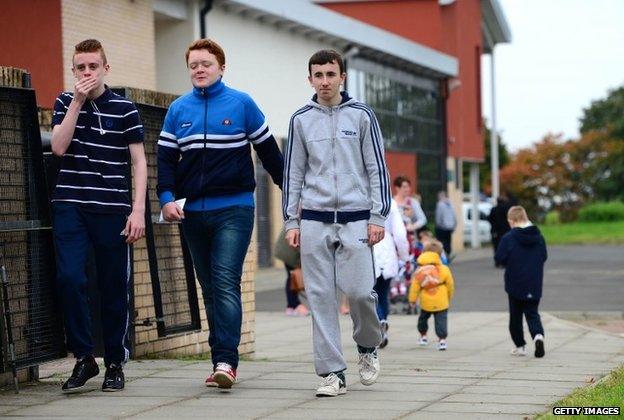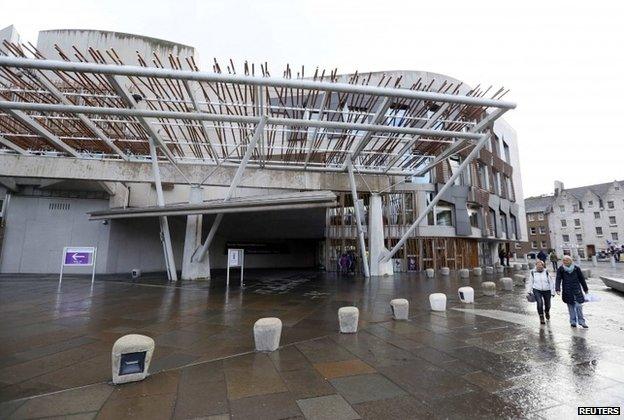Rising to the challenge
- Published
The division in the referendum could scarcely have been more fundamental: "Should Scotland be an independent country?"
Answer given, it was incumbent upon our elected politicians to rise to the challenge of seeking a degree of consensus. The alternative, of course, would be political stasis.
In the debate at Holyrood, today, they rose to the challenge, for the most part. Indeed, they rose to the challenge rather well.
They agreed that the turnout had been remarkable, energising.
They agreed that the experiment in enfranchising 16 and 17-year-olds had worked well and should be extended to other ballots.
They agreed that the conduct of the referendum had been, mostly, a credit to the people of Scotland, enhancing our global reputation.
Admittedly, there was some dispute over that.

Holyrood politicians said 16 and 17-year-olds should be able to vote in all elections
Alex Salmond reckoned this creditable reputation had been achieved "with the exception of a handful of miscreants". Johann Lamont and others reckoned the miscreant tally was rather larger. On both sides.
There was more argument still over the reasons for the result. One or two SNP members complained of scare tactics by their opponents, particularly with regard to pensions. But, mostly, the tone was of acceptance.
But not, it should be noted, mute acceptance. Alex Salmond repeated his warning that Unionist politicians would find their feet "held to the fire" to ensure they delivered on more devolved powers.
And he went further. In the gallery, taking note, was Lord Smith of Kelvin - who has been tasked with examining what those powers should be.
Mr Salmond set out his aims: job creation; equity; and a stronger voice for Scotland on the international stage. The SNP, he confirmed, would participate in the talks.
Constitutional politics
It was a good, if slightly subdued speech, by Mr Salmond. Understandably subdued given the result and his decision to step down.
In response, his counterparts praised his endeavours and promised to say more on that subject at a more appropriate point.
If Mr Salmond's opening speech was successful, it was notable that he was matched in that by Labour's Johann Lamont.
Facing gossip that she is set to be replaced, she produced a thoughtful, well-modulated, well-constructed address.
Ms Lamont has longed to move on from constitutional politics - which scarcely thrills her - to the everyday concerns of people in Scotland.
Today she contrived that deftly, with a neat argument.

Discussion has turned to increasing the powers of the Scottish Parliament
The people of Scotland, she said, had now spoken in favour of the Union. Not the "privileged few" - a reference, I presume, to the original Treaty - but the majority of popular opinion in a capacious plebiscite.
She, for one, did not need her feet "held to the fire".
There would be movement towards more powers, as set out in the referendum. But power with a purpose to tackle issues such as employment, childcare, the NHS and land reform.
And she offered to work with the Scottish government on such issues but - explicitly, note - in the context that the issue of constitutional governance had been settled. And was accepted as such.
Good contributions too from Ruth Davidson of the Tories ("accept the result"), Willie Rennie of the Liberal Democrats ("devolve to communities") and Patrick Harvie of the Greens ("consult the people, not just the politicians.")
Perhaps the neatest comment came at the outset, as Presiding Officer Tricia Marwick delivered a few thoughts in Time for Reflection.
Business as usual was off. Not changed utterly, then. But changed.